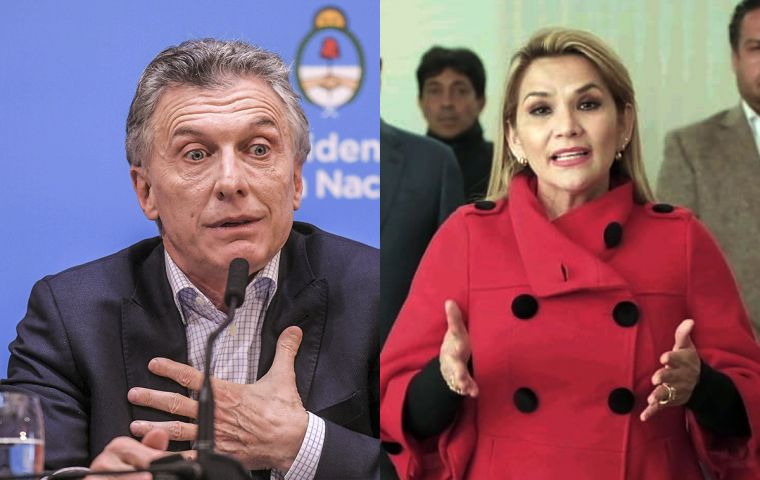MercoPress. South Atlantic News Agency
Bolivian Prosecutor says evidence proves Macri's help to Áñez
 The Governments of Argentina, Ecuador and possibly Brazil helped rebels hold a coup against Evo, Chávez said
The Governments of Argentina, Ecuador and possibly Brazil helped rebels hold a coup against Evo, Chávez said Bolivia's Chief Prosecutor Wilfredo Chávez said documents proved the Argentine Government of former President Mauricio Macri was involved in topplig Evo Morales in 2019 on the alleged grounds of an electoral fraud which was never proven.
The 52-year-old Chávez said in a virtual interview with Buenos Aires' daily Página/12 that the Bolivian rebels who staged the uprising leading up to Morales' resignation had direct support from the Casa Rosada and elsewhere.
“It was not only Argentina, but also Ecuador, and the information we have obtained is that, in fact, during the days of the coup, extralegal negotiations were carried out so that from government to government they supported themselves by supplying weapons and dissuasive supplies to the civilian population, which have been used unhappily in the subsequent massacres that occurred on November 15 and 19 in my country. The way these materials were entered was absolutely irregular and illegal. The distribution was done in the same way,” Chávez explained.
He added that from written evidence unearthed recently, “there was cooperation, either at the consular level or of armed entities.” He also pointed out that while Macri has denied any involvement, the documents proved his participation “both in sending and receiving” military equipment, which is “why I believe that this process will conclude with an accusation” against the former Argentine head of state.
“We are talking about a coup ... and also about actions after the coup ... assisting a murderous, criminal government that took over the old government palace precisely to replace political positions that the ballot boxes had denied [them] for so long,” Chávez went on.
“It was clearly a coup. With deaths, with tanks, with all the brutal way in which power was exercised,” he stressed as he vowed to let the world know about “international cooperation and participation” once his own inquiry is finished.
Chávez also addressed an alleged encounter between Bolivia's then acting President Jeanine Áñez and Brazil's Jair Bolsonaro, when in theory “Áñez never left the country,” which would add Brazil to the list of foreign collaborators to the uprising. “The first government to recognize [Áñez as president] was that of Bolsonaro a few hours after taking office,” Chávez pointed out.
“We want to get to the historical truth of what happened in that November, before and after these people took over the government in Bolivia by force,” he further explained.
Chávez was confident his investigation would prove the existence of foreign help, particularly from Argentina'0s Macri and Ecuador's Lenín Moreno.
Regarding Áñez, Chávez explained there were two issues to be considered: First, how she accepted to become President when she was not next in line after the resignations of Morales and Vice President Álvaro García Linera, for which she needs to be tried “as an ordinary citizen” who seized power. And then there is “terrorism, sedition, massacres,” with a third case against her brought forward by the Attorney General's Office (Justice Ministry) for “crimes committed in the exercise of functions as the person who exercises the de facto presidency.”
(Source: Página/12)




Top Comments
Disclaimer & comment rulesCommenting for this story is now closed.
If you have a Facebook account, become a fan and comment on our Facebook Page!